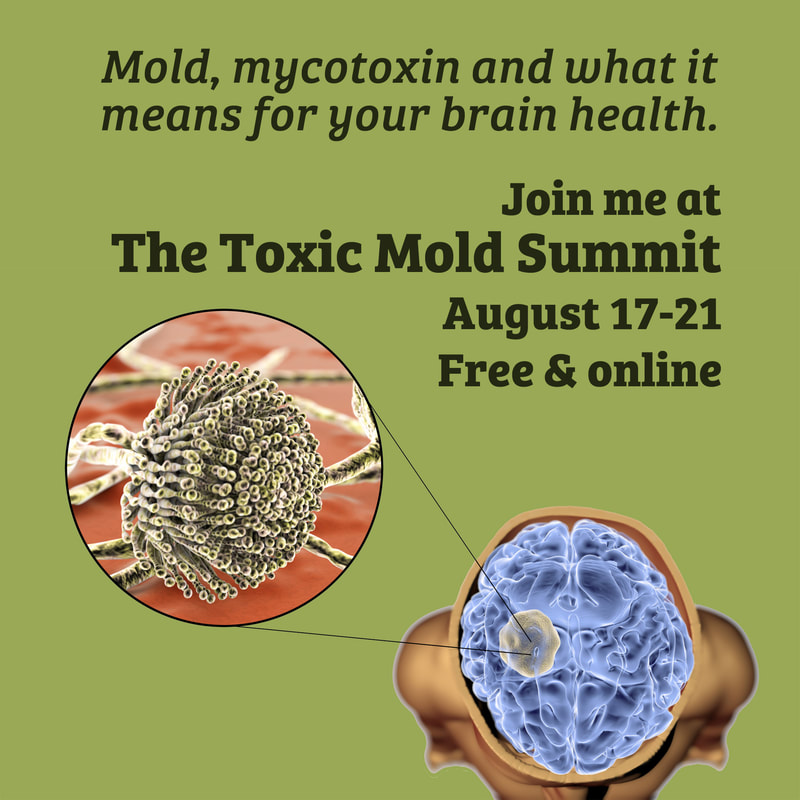I’ll be discussing in detail at The Toxic Mold Summit how to identify signs and symptoms of mold toxicity as well as treatments that can help with recovery. The presentation will spotlight:
The facts about mold: • Mold is incredibly resilient, often surviving for years and thriving even more now given the unpredictable events of climate change that may encourage its growth. • Most homes and workplaces have some degree of mold – for people who might not be as sensitive to the fungi and spores, it may never cause a serious problem. But for others, particularly people with underlying health conditions, mold exposure truly can be lethal. So finding the source is critical to recovery. • Mycotoxin are produced by mold, or fungi organisms, capable of causing severe illness, a host of serious diseases including neurological disorders. • Difficult to detect in the bloodstream, mycotoxins are extremely small, can pass through our olfactory sensory neurons and can cross the blood-brain barrier (BBB) while also moving freely throughout our body causing immune suppression and cell damage. • When the immune system is challenged by these toxins, it can over-activate the microglia, designed to serve as our body’s first-line of defense, which in turn creates a cascade of neuro-inflammation and a resulting cytokine storm. You may be familiar with these “storms” as they’ve been spotlighted in connection to the dramatic immune reactions seen in patients with severe cases of Covid 19. And we know too that cytokines increase the permeability of our BBB – so you can see just how concerning it is to be exposed to the harmful effects of something that despite being very small can have such an enormous impact on our health. When mycotoxins affect the brain. Every neurodegenerative disease, from autism and multiple sclerosis to Alzheimer’s and ALS, has studies that revealed evidence of fungi in the brain. Mold toxins destroy myelin, axons, causes neurodegeneration, kills olfactory neurons, and damages our cell membranes and mitochondria. People afflicted with toxic mold syndrome often have numerous systemic symptoms including cognitive-related problems such as: -Headaches -Forgetfulness -Impaired memory -Inability to recall words -Vertigo and dizziness -Poor concentration and more. Mycotoxins can impact mental health as well, contributing to anxiety, depression, mood swings or behavioral changes that just compound other neurological symptoms. How can we treat mold-related illnesses? There are a number of recommendations using the principles of integrative medicine to address mold toxicity, featuring a comprehensive program that focuses on eliminating mold from your environment (both home and work) as much as possible and measures to rid your system of these pathogens. Healing the gut and establishing a healthy microbiome through an appropriate nutrition plan is key to a less-vulnerable BBB. We also focus on neuroplasticity, stress reduction, quality sleep, reducing toxic load to help the liver, along with other efforts that consider a whole-system approach to helping you and your brain heal from the effects of mold exposure. Let’s remember the words of Buddha who said “The mind is everything. What you think, you become.” Our world must be conscious of the ongoing environmental impacts we have faced long before the advent of Covid 19 and take all the steps we can to ensure we can enjoy healthier days ahead! Perhaps in our collective Mantra, we will think more positively, and attempt to cultivate more goodness for better lives, a better world and the future of humanity. In hope and healing, Dr. Suzanne Gazda To register for the Toxic Mold Summit please visit: https://toxicmoldproject.com/?idev_id=29365 Additional reading: https://www.suzannegazdamd.com/blog/mold-toxicity-its-real https://www.suzannegazdamd.com/scientifically-speaking1/mold-is-bad-news-for-the-brain To view and download our Mold Recovery Plan see: https://www.suzannegazdamd.com/uploads/3/8/3/4/38341157/cir_chronic_inflammatory_response_syndrome.pdf
0 Comments
Your comment will be posted after it is approved.
Leave a Reply. |
AuthorDr. Suzanne Gazda, Integrative Neurology Archives
February 2024
Categories |

 RSS Feed
RSS Feed